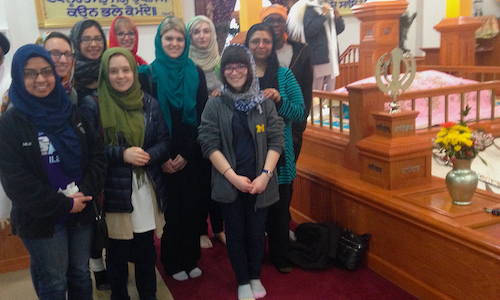When Arifa Javed sees hate, she explores ways to educate.
So Javed decided to make a documentary film after noticing an increase in hate crimes starting after Sept. 11, 2001, and continuing today. The sociology lecturer wanted to show common human experience—real people with their families at home, at work, at worship, at play. But she also wanted people to share what makes them culturally unique.
“When people don’t understand, they are more likely to be afraid and react before thinking—that is true of any person around the world,” she said. “I wanted to give people a way to comfortably get an insight about different cultural groups. My overall mission is to promote peace through understanding.”
Javed recently finished her latest film, The Season in the Mist: Sikhs in America. In the 30-minute piece, she meets with several Indian Sikhs in Michigan—male and female, adult and child, immigrant and native—and records their stories and experiences.
She said although Sikhs have established a community in the United States, they often are mistakenly identified as members of other ethnic groups. Serving as writer and producer, Javed made the film with a sociological perspective, discussing Sikhs as a distinct group among Indian immigrants, highlighting their religious and cultural details.
“I noticed more and more Sikh-Americans were hate crime targets. It was confusing to me, as America is the only country in the world that is so welcoming to immigrants in allowing them survive, thrive and gives back to the society,” said Javed, who plans to screen the documentary at a film festival before bringing it to campus. “I didn’t understand how people thought they were avenging Sept. 11 by committing crimes against people because of skin color, beards or turbans.”
She said she kept noticing news stories about Sikhs killed at their places of business, their houses of worship, and an overall increase of hate crimes—which led to the FBI adding them onto their annual report on hate crimes in 2016.
“Not all hate crimes are this extreme, but they all have a negative effect on our society. Taking a step back and thinking as a sociologist, I realized that if a turban is not part of your culture, there might be fear and confusion there. And everyone who wears one might look the same to you. So let’s talk about that.”
This film follows her first documentary, Essential Arrivals-Michigan’s Indian Immigrants in the 21st Century, which she wrote and produced in 2014.
“After my first film Essential Arrival that focused on a new featured player on America's immigration stage—Indian immigrants—I decided to go further in the Indian Immigrant community and highlight some religious and cultural details of the Sikhs immigrants from India,” Javed said. She currently is working on a new film that explores the cultural identity of Indian Muslims.
Social dynamics revolving around cultural issues are the focus of Javed’s research. Javed, who moved from India to the United States in 1995, works extensively with post-1995 immigrants of varied ethnic backgrounds in the U.S., including Arabic, Bosnian, Bangladeshi, Chaldean, Pakistani and Indian immigrant families.
Javed said she’s thankful for the people featured in her work who have given their time to share their experiences. And she’s thankful for audiences who have taken the time to listen. She said both students and community members are genuinely interested in their stories.
“There isn’t much out there that represents the Indian way of life in immigrant literature. So I wanted to create these films to provide information to a broad audience and give a platform to have discussion,” she said. “It is a privilege to be able to take a look into others’ lives and learn from them. It’s also a privilege to teach. I’m putting both of these together to promote understanding and plant seeds of peace.”




